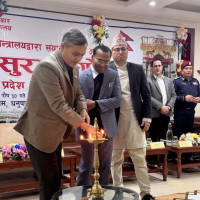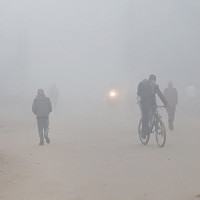- Wednesday, 14 January 2026
Health camp held for elephants in Chitwan
By Shaligram Nepal,Sauraha, Nov. 7: A one-week health camp has been organised for the elephants of Chitwan to treat various diseases including injuries, rabies and tuberculosis.
Dr. Bijay Shrestha, Senior Veterinarian of Chitwan National Park (CNP), has said that the health camp is aimed at addressing various health issues and providing vaccinations to the elephants. The programme at the camp includes treating wounds and administering vaccinations against tetanus and rabies.
He explained that due to their large size, wounds and other health issues may not be immediately visible in elephants, and it is more effective to treat them after conducting the camp and thoroughly examining their health. While health camps are a common practice for humans, there are comparatively fewer such camps for animals.
Dil Bahadur Purja Pun, Chief Conservation Officer of CNP, has informed that a total of 115 elephants from CNP and private areas will receive treatment within the span of a week.
Dr. Shrestha explained that the activities conducted during the camp encompass tasks such as trimming the toenails of the elephants, tending to their wounds, conducting comprehensive health check-ups, isolating and treating them if they are unwell, and taking preventive measures against communicable diseases.
Initially, the camp is catering to 60 government-owned elephants and commenced at Khorsor in Sauraha on Monday. After the park office conveyed that elephants from the private sector would also receive treatment.
Tetanus in elephants
Tetanus found a significant health concern among elephants in Chitwan. The park office has reported that both elephants employed for transporting tourists and those utilised for security purposes are displaying signs of injuries.
As elephants move through the forest, they encounter sharp sticks and wooden spikes, which can lead to injuries on their legs and bodies.
Dr. Shrestha explained that if these issues are not identified promptly, the wounds can exacerbate and become more severe. Even when wounds are identified and treated, the problem may recur. Therefore, security measures have been implemented to address this ongoing issue.
Dr. Shrestha mentioned that they treat these sores as non-contagious diseases. Due to their massive body weight of around 4,000 kilograms, healing wounds can be a lengthy process and poses challenges, even if there is no tuberculosis. These wounds can still cause problems for the elephants.
He further explained that they have been treating these issues, but it has been challenging to completely eliminate the problem because the elephants regularly venture into the forest. “While grazing in the forest, there is another concern of them consuming soil, which can hinder the digestion of other foods. When their digestive system faces problems, it can lead to various other health issues,” he said. He emphasized that after identifying these issues during the camp, all the elephants will receive the necessary treatment.
Elephant habitat is being destroyed
Experts have pointed out that elephants require a large body and a substantial habitat, making deforestation a significant challenge to their well-being.
In Chitwan, the only elephant breeding centre, there are 60 government-owned elephants, along with an additional 30 domesticated ones. The essential grazing area for these elephants is within the forest.
Although the government elephants go to the forest within the park, the private ones go to the buffer zone areas. A large body requires a lot of food. It is necessary to have a lot of forest area for their food.
Dr. Shrestha said that as the forests are being destroyed due to the increase in human population and development infrastructure, the habitat of elephants has been encroached upon.
Ganesh Prasad Tiwari, Information Officer of the park, said that although CNP is suitable for animals such as elephants, tigers, and spotted dear, the habitat of animals is being challenged every year due to human pressure on the forest.
There is also another challenge to reduce conflict between humans and animals within the park, he added.
















